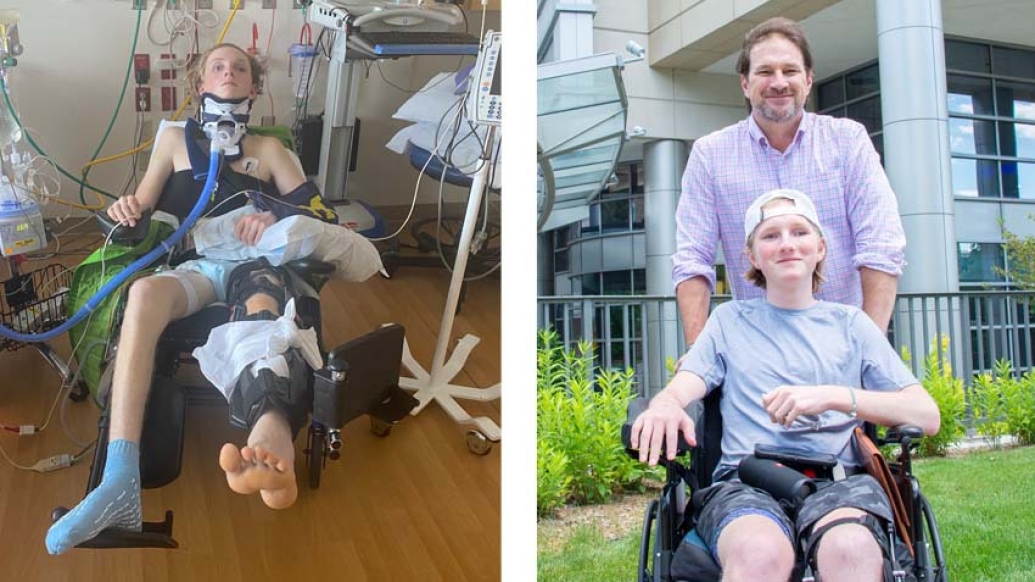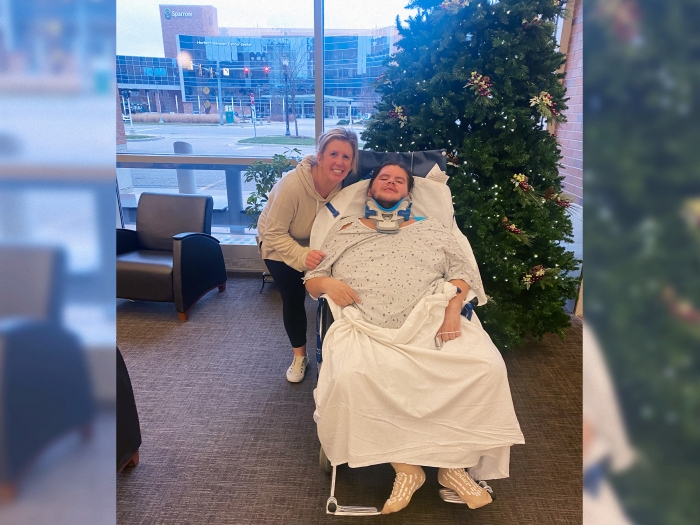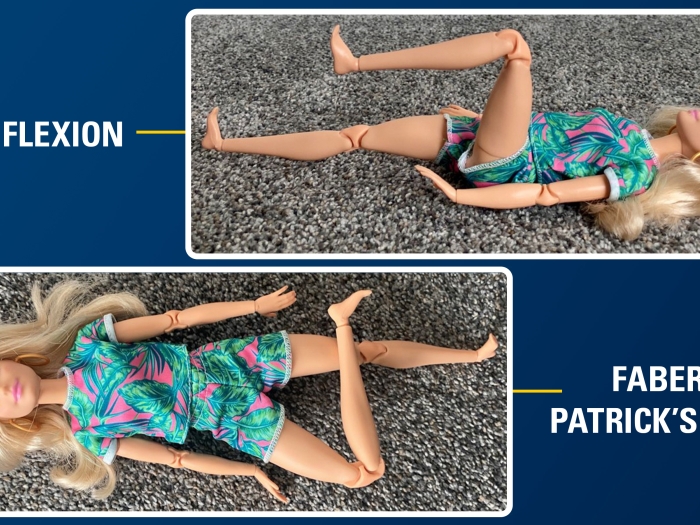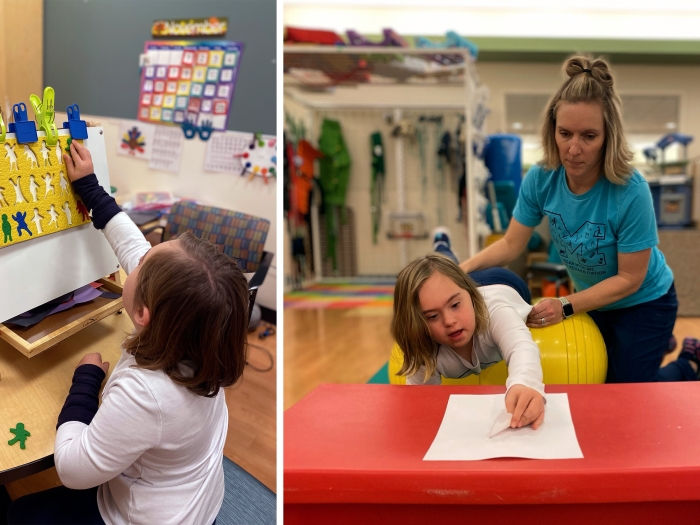His “toughest finish line yet” involves work with rehabilitation physicians, orthopedists and neurosurgery specialists.
9:50 AM
Author |

After a car crash left him with crippling injuries, a teenage ski racing champion is walking again and undergoing intensive therapy – his eyes focused on the slopes.
"I do want to be back on the hill right now," said Anders "Ders" McCarthy, 17, of Harbor Springs. "I didn't think the Olympics were really a possibility, but I thought I could get some eyeballs for skiing in college."
McCarthy lives his life at the highest speed. He grew up near the base of Nub's Nob Ski Resort and has spent weekends racing across the region for the better part of the last decade.
Slowing down wasn't an option – until the near-fatal crash eliminated all others.
"When Ders first came to us, he was in a coma, and his injuries were life-threatening," said Alecia K. Daunter, M.D., a pediatric physiatrist in Michigan Medicine's Department of Physical Medicine and Rehabilitation. "For the next month, he was not really able to follow commands or move his body in any way. For some people, that can be permanent."
On March 6, McCarthy was driving to Boyne Mountain near Petoskey when he crashed into another vehicle on the highway. He had traumatic brain swelling, coupled with a broken clavicle, a broken tibia, torn ligaments in his knee and a brachial plexus injury that damaged the nerves in his right arm.
SEE ALSO: Regaining Lost Function with the Help of Video Games
"He didn't open his eyes until the 12th day," Ders' father, Mac McCarthy, said. "He stayed in the pediatric ICU for 32 days, and when he came to the rehab floor, he was just starting to acknowledge things like pain with a head nod. At about the 50th day, he started to whisper words."
Actually, he was mouthing the lyrics to the rap song, "Skechers," by DripReport. The first moment where, despite the stifling trauma, Ders' personality shone through, Daunter said.
"Honestly, I couldn't believe it when they told me he was rapping," she said. "Luckily, it was caught on video! From then on, we started to see more and more of Ders' smiles. Not long after, his dad had to fill me in on some of their inside jokes."
Ders' road to recovery involves a slew of specialists at University of Michigan Health C.S. Mott Children's Hospital. Pediatric orthopaedic surgeons, neurosurgeons, physiatrists and nearly every possible member of the rehabilitation team have worked with the 17-year-old.
"The ability to have input from all of the specialists he needs has been crucial to his recovery," Daunter said. "You don't get that all in one place in most hospitals. Elsewhere, it likely would have been on the family to try and piece together from follow-up appointments."
While admitted to the inpatient rehab hospital, Ders completed physical, speech and occupational therapy every day before noon. After lunch, he headed down the hall back to the gym, regaining his step and testing his strength.
His right leg, Mac noted, is currently "the star of the appendages."
"The hero of the limbs," he chuckled, while listing off Ders' challenges. "He's not getting much from the right forearm and bicep because of the brachial plexus. We're getting ready for a surgery there. Then his left knee needs to be redone. But the biggest concern is to keep work working on the traumatic brain injury."
He's an athlete, a skiing racer with a lot of success already, and the finish line he is approaching with this massive hospitalization and rehabilitation is probably the biggest challenge of his life.Alecia K. Daunter, M.D.
Ders is still building new memories. One of the first, unquestionably, will be the 14 weeks his father spent by his side in Ann Arbor. Mac McCarthy stayed in a nearby hotel, attending and participating in almost all of Ders' therapies – a level of commitment Daunter will not forget either.
"Mac arranged cones in the therapy room in a figure-eight, so Ders could push a walker in the way that matched what he would do when he was skiing," she said. "Ders looks to him for support, and they have a wonderful back-and-forth. The father-son team is at the center of this."
The weeks of sharing meals, wandering the city and attending therapy together reinforced the bond between Ders and Mac. The crash also changed both of them as people.
"There's a lot less yelling than there used to be," Mac said. "The stuff that you got hung up on before just seems inconsequential now, and our relationship has changed for the better. It made us aware of how lucky we are. He has the chance to get back. Being here, you see young children without a chance from the start. We feel lucky to have that chance."
SEE ALSO: Nearly Half of COVID-19 Patients Left Hospital in Worse Physical Condition
On June 15, just 100 days after the crash put him in a coma, Ders McCarthy rolled out of Mott and headed to Grand Rapids for outpatient therapy. The team of physicians likely won't know the full scope of McCarthy's recovery timeline for months.
"This is a long road," Daunter said. "He's an athlete, a skiing racer with a lot of success already, and the finish line he is approaching with this massive hospitalization and rehabilitation is probably the biggest challenge of his life."
Ders is racing to it – as fast as he can.
"I can't change what happened," Ders said. "I just want to move forward, get through therapy and do well in school coming back from this. Eventually, I want to ski again."

Explore a variety of healthcare news & stories by visiting the Health Lab home page for more articles.

Department of Communication at Michigan Medicine
Want top health & research news weekly? Sign up for Health Lab’s newsletters today!





